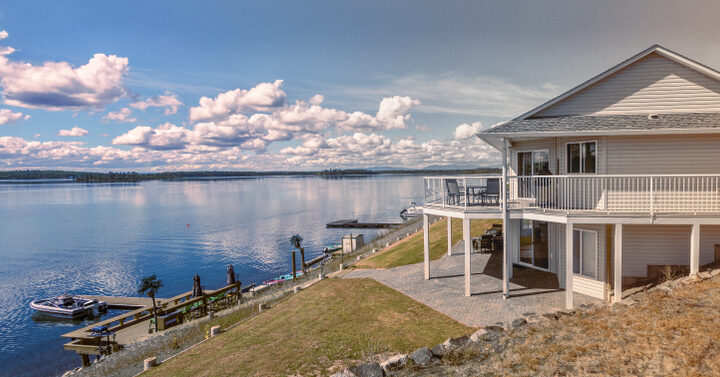Just the PeaksThis newsletter at a glance
|
Ease your mind and explore the possibilities with Everest at your side
Picture this: you’ve settled into your primary residence and have taken a nice bite out of your mortgage. Or, maybe you’ve come into some money and want to invest.
If you live in the Northeast (or anywhere for that matter!), you’ve probably always dreamt about owning a second home.
Whether a quaint beach cottage, rustic lakeside cabin, or swanky ski chalet in the mountains, a second residence gives you so many investment opportunities. Will your family use it for vacation? Rent it out for extra income? Lease to renters?
The possibilities are endless!

Before you start planning your next big purchase, you must account for the many complexities that go into owning a second home. Buying that vacation pad is vastly different than a primary residence, so it’s best to take things slowly to ensure you make a smart, strategic decision.
First and foremost, consider the current market.
The Real Estate Housing Market
An Everest Crash Course
We hear it all the time: “The market is booming!” or “Are you crazy? Not in this market!” But have you ever stopped to consider, what does ‘the market’ really mean?
In short, there are three types of real estate markets: buyer’s market, seller’s market, and balanced market. Knowing which type of market you’re in can help you position yourself for success from both sides of the negotiating table.
Buyer’s market
The basics:
- There are more properties for sale than there are buyers
- Homebuyers have more options and negotiating power
- Homes typically sit longer and sell at lower price points
- It’s the best market to be in if you’re purchasing a home
Seller’s market
The basics:
- There are fewer properties listed than there are homebuyers
- Buyers find themselves in bidding wars (if they can find a home!)
- Competition means homes sell faster and at higher price points
- It’s the best market to be in if you’re selling your home
Balanced market
The basics:
- Both buyers and sellers are on an even playing field
- The number of homes for sale meets current demand
- Appraisals are on par with offers and prices plateau
- Occurs briefly between transition from one market to the other
Learn more at Millionacres.
Now that you know the market basics, let’s move on to some more specific aspects of second home ownership.
On second thought…

Regardless of the pandemic, record-high inflation, and tensions in Eastern Europe, American minds are still set on a permanent vacation.
“Hybrid living is the catchphrase of the day,” says Leonard Steinberg of Compass Inc. “The perception is that if you have a second home, you have to be a billionaire, but what we’ve recognized especially in the past 18 months is that it’s possible to have a small apartment in the city and a small home outside the city.”
Consider these tips, tidbits, and pointers before you journey to paradise.
1. Never buy on impulse

Sometimes people go on a trip and come home with the title to a condo. Big no-no.
Even if you have an amazing vacation experience, these decisions require significant time and thought. Go home, settle back into your routine, and start researching the market where you want to buy.
Can you afford a home in this area? What are the taxes like? Will there be homeowners’ association fees? If it’s a resort town, do things shut down during winter? If you’ll be driving, what’s the traffic like? Always know before you sign.
2. Keep long-term goals in mind

Beyond budget, your age, lifestyle, and family goals should also play a major role in your decision-making.
Do you and your spouse plan on retiring to your second home some day? Is this just a place to crash on weekends? Or do you expect to stay for months on end?
These are the types of things you don’t think about on vacation. If your second home becomes your permanent residence, you will want to enjoy all the expected conveniences of a diverse and thriving town. Proximity to shopping, restaurants, entertainment, and healthcare are all important.
3. Type of home is key

Hate pulling weeds on weekends? Not interested in hiring a maintenance man? People who are seduced by the glamour of vacation life forget about the realities of homeownership when purchasing a second (single-family) home.
Take some time to think about the type of home that is right for your family.
Even though a traditional home gives you space and privacy, an apartment or condominium often comes with security, maintenance, and landscaping included.
4. Tax breaks may be available

The reality is, if you own a second home, that means a second set of tax payments each year. It also means you must pay taxes on rental income if you choose to share your home with others. Still, don’t forget to look into possible tax advantages.
“You don’t have to pay taxes on rental income if you rent out your home for fewer than 15 days a year, but you can deduct any rental expenses,” notes HGTV. “If you rent out your home for more than 15 days a year, you have to report the income, but you can deduct expenses like maintenance and cleaning.”
5. Extra income is sweet

If that second mortgage is hurting your pocket, renting your getaway pad is a great way to generate additional income. When you’re at your primary residence, you can board temporary guests via VRBO, Airbnb, or similar rental sites.
Just remember: “Being a landlord comes with more responsibilities than many realize.”
Always consult your local landlord/tenant laws and consider other rent-related issues.




